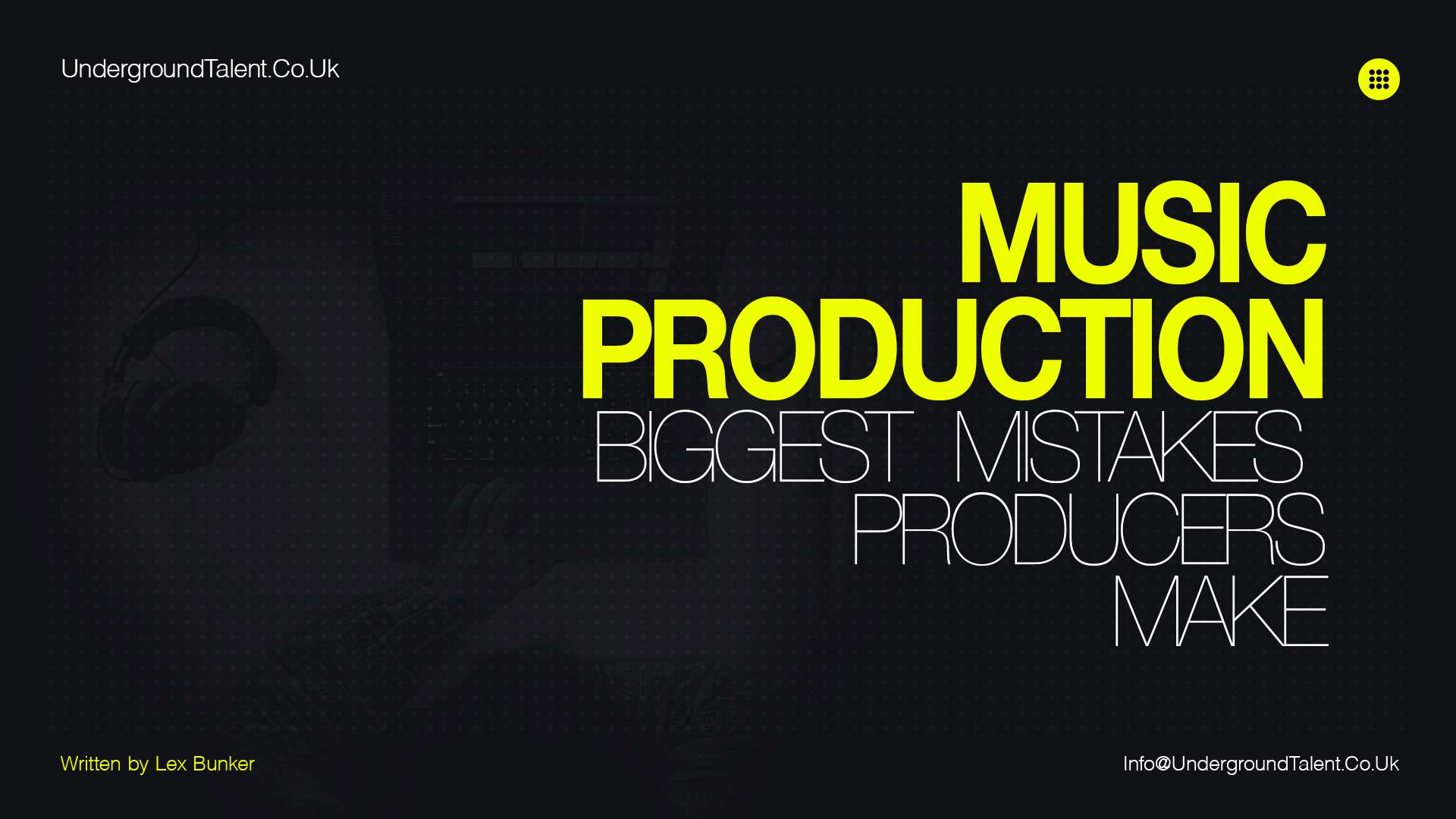Introduction: Navigating the Complex World of Electronic Music Production
Embarking on the journey of electronic music production is an exciting endeavour, filled with endless creative possibilities. However, it’s a multifaceted process that involves much more than just creating catchy beats. From understanding music theory and mastering sound design to perfecting the art of mixing and mastering, there are numerous skills to learn and hone.
Music production often involves a significant learning curve, and it’s not uncommon for beginners to make several mistakes along the way. But these errors are not setbacks; rather, they are opportunities for growth and improvement. By acknowledging these common music production mistakes and utilizing the wealth of electronic music production tips available, new producers can steadily improve their skills and create high-quality, original music.

Don’t Miss: Rave In London? Rave Responsibly.
Avoiding Pitfalls and Maximizing Potential in Electronic Music Production
A successful music production process involves not only technical skills but also certain personal attributes such as patience, an openness to feedback, and a willingness to continually learn and diversify one’s skills. It’s also crucial to invest in good music production equipment and software, understanding that the tools used can significantly impact the final output.
Moreover, music production isn’t just about creating music. It’s also about understanding the music business, including concepts like copyright, licensing, and marketing. This knowledge can help producers protect their work, reach a wider audience, and even monetize their craft.
In this article, we’ll delve deeper into these topics, providing beginners with a comprehensive guide to avoid common pitfalls and maximize their potential in electronic music production. Whether you’re seeking to understand electronic music genres, looking for the best music production hardware, or wanting to learn how to mix and master music, this guide will offer valuable insights to help you on your music production journey.
Download Free: Techno Sample Pack: 64 One-Shot Samples + Producers Tips
The Importance of Music Theory in Electronic Music Production
A solid understanding of music theory is a cornerstone of successful electronic music production. Although it might seem daunting to beginners, music theory provides the necessary foundation for creating harmonious melodies, compelling chord progressions, and engaging rhythms. When producers understand music theory, they can avoid basic music production mistakes and enhance the emotional impact of their tracks.
Mastering the basics such as scales, chords, and rhythm can significantly improve the quality of a producer’s work. By understanding how different musical elements interact, producers can make more informed decisions when composing and arranging their tracks. There are plenty of resources available, such as online electronic music production tutorials and music theory courses, to help producers at all levels deepen their theoretical knowledge.
Don’t Miss: Cinematic u-he Diva Presets | Metropol
The Role of Sound Design in Creating Original Tracks
Sound design plays a crucial role in shaping the identity of a track and the producer’s unique sound. It involves creating, manipulating, and arranging sounds to achieve a desired effect or mood. This can range from designing complex synth patches to creating ambient soundscapes. Through sound design, producers can create original electronic music that stands out in a crowded music landscape.
For beginners in sound design, experimenting with different sounds and effects in music production software is a great starting point. Reading music production software reviews can help find a program that best suits a producer’s sound design needs. Additionally, producers can improve their sound design skills by analyzing the work of others, trying to recreate sounds they like, and constantly experimenting with different techniques. Remember, in sound design, as in all aspects of music production, there are no hard and fast rules – only endless possibilities for creativity.
Don’t Miss: Techno Loops V1: High-Quality Analog Loops for Music Production
Understanding the Art of Mixing and Mastering
Grasping the art of mixing and mastering is crucial for any electronic music producer aspiring to create professional-quality tracks. This process involves balancing the elements of a track, enhancing the audio, and ensuring consistency across various playback devices. While it may seem daunting for beginners, understanding music theory and sound design can greatly simplify the music production process, including mixing and mastering.
One common music production mistake is neglecting this final stage, resulting in tracks that may sound unbalanced or “muddy.” To avoid this, it’s worth investing in good music production equipment and software designed for mixing and mastering. Improving your skills in this area might take time and patience in music production, but the results can significantly enhance the overall quality of your tracks. Continuous learning through electronic music production tutorials, feedback from other producers, and staying updated with music production software reviews can expedite your mastery of mixing and mastering.
Read Also: Techno Sample Pack: Unleash Your Creativity with Techno Shots
Diversifying Skills for Versatile Music Production
In the world of electronic music production, versatility is a valuable asset. Diversifying your music production skills not only makes you a more rounded producer but can also open up new creative avenues and prevent you from getting stuck in one genre or style. Understanding electronic music genres, music theory, and mastering the art of sound design are critical components of this diversification.
Avoiding common music production errors, like over-reliance on certain techniques or sounds, comes with experience and an expansive skill set. It’s about knowing how to mix and master music across different genres, understanding how to arrange a track effectively, and being proficient in creating original electronic music that resonates with your audience.
Investing time in learning new production techniques, software, and hardware can help diversify your skills. Taking breaks in music production to explore and learn can prove beneficial, providing fresh perspectives when you return to your own work. Remember, feedback for music producers is a goldmine for learning, helping you identify areas for improvement and new techniques to try. In the dynamic field of music production, continuous learning and skill diversification are the keys to staying relevant and innovative.
Don’t Miss: Fossil Archive aka Roberto / R.M.K. @ Special Guest Interview
Patience: A Key Ingredient in Music Production
Patience in music production cannot be overstated. Learning the intricacies of music production, from understanding music theory to mastering the art of sound design, is a journey that requires time and dedication. It’s common for new producers to be eager for immediate results, but this can often lead to music production mistakes, such as rushed mixes or overlooked details in the track. Patience allows for a more thoughtful approach to improving music production skills, leading to higher quality and more refined output.
Adopting a patient mindset also means acknowledging the importance of taking breaks in music production. A fresh set of ears can bring a new perspective, helping to identify areas of improvement that may have been previously missed. Feedback for music producers is also a crucial part of the process, as it provides different viewpoints and constructive criticism, which are essential for growth.
Don’t Miss: Techno Events: How to Plan & Organize the Perfect Techno Party
The Pitfalls of Overcomplicating the Production Process
In the quest to create original electronic music, some producers fall into the trap of overcomplicating the production process. The belief that complexity equals quality can lead to cluttered and confusing tracks. One of the most valuable electronic music production tips is understanding the power of simplicity. A well-arranged track with a clear focus often resonates more with listeners than a complex one with too many elements fighting for attention.
Simplifying the music production process involves a deep understanding of each component, from sound design to arrangement, and knowing how to effectively use music production software and hardware. Continuous learning, through resources like electronic music production tutorials, can provide insights into avoiding common music production errors and keeping the process streamlined and effective.
Don’t Miss: How to Stop Procrastinating & Finish Your Tracks?
The Crucial Aspect of Arrangement in Music Production
Arrangement is a crucial aspect of music production that often doesn’t get the attention it deserves. A great melody or sound can lose its impact if not properly arranged within a track. Understanding how to introduce and withdraw elements at the right time can create a dynamic and engaging piece of music.
Music track arrangement tips often suggest building a story with your track, introducing elements slowly, building up to a peak, and then gradually winding down. This requires a solid understanding of music theory, sound design, and mixing and mastering techniques. As with all aspects of music production, patience, practice, and being open to feedback can significantly improve your skills in arrangement. Investing in music production equipment and software that aid in the arrangement process can also be a game-changer in producing professional-quality tracks.
Read Also: Brutalism by Erald (Free Sample Pack)
Investing in Quality Equipment and Software: A Worthwhile Step
Investing in quality equipment and software is a step that can significantly elevate the output of any music producer. High-quality equipment can enhance sound capture and reproduction, while advanced software can provide a wide range of tools for mixing, mastering, and sound design. Producers can avoid common music production errors by using software that provides more control and precision in the production process.
However, it’s important to remember that the best music production hardware or software is only as good as the person using it. Understanding music theory, diversifying music production skills, and continuous learning through resources such as electronic music production tutorials are crucial to fully utilising these tools. Additionally, staying informed through music production software reviews can help producers make informed decisions about what tools would best suit their needs and workflow.
Read Also: How to Promote Electronic Music | 10 Ways For Beginners
The Value of Taking Breaks During the Music Production Process
Taking breaks in music production is more than just a respite; it’s an essential part of the creative process. Continuous work can lead to fatigue, which can affect decision-making and lead to music production mistakes. A break can provide the distance needed to return to a track with a fresh perspective, making it easier to spot errors or areas for improvement.
In addition to preventing fatigue, breaks can also serve as opportunities for learning and reflection. Producers can use this time to explore electronic music production tips, understand electronic music genres, or seek feedback for their work. Thus, taking breaks can contribute to improving music production skills and the overall quality of the output.
Don’t Miss: Techno Sequences for u-He Diva. Designed by Erald.
The Power of Feedback in Improving Music Production
Feedback is an invaluable tool for any music producer aiming to improve their craft. It provides a different perspective, helps identify blind spots, and offers opportunities for learning and growth. Feedback for music producers can come from various sources, such as fellow producers, mentors, or the audience, and can cover everything from sound design to arrangement.
Constructive criticism can help producers avoid common music production errors and find new ways to diversify their skills. It also encourages producers to step out of their comfort zone and experiment with new techniques, genres, or software. However, it’s important to remember that while feedback can be incredibly useful, it’s also essential to stay true to your own musical vision and not lose your unique sound in the process of trying to please everyone.
Read Also: Stop Being a Perfectionist by Lex Bunker
Navigating the Music Business: Essential for New Producers
Understanding the music business is an often-overlooked aspect of being a successful music producer. Beyond creating compelling music, producers also need to navigate copyright laws, understand licensing agreements, and effectively market their work. This knowledge can prevent legal issues down the line and ensure that producers receive fair compensation for their creations.
New producers can learn about the music business through various resources, such as online tutorials, books, and mentorship programs. Joining producer communities and forums can also provide valuable insights from peers and industry professionals. Having a strong grasp of the music business not only protects producers but also empowers them to make informed decisions about their journey.
Don’t Miss: House Music – An In-depth Guide to Music Production
Final Thoughts: Embrace Mistakes and Enjoy the Process of Creating Music
In the journey of music production, it’s important to remember that everyone makes mistakes when they’re starting out. These mistakes, whether they’re in mixing and mastering or in sound design, are not failures but opportunities for learning and growth. Instead of striving for perfection, new producers should focus on improving their skills, understanding music theory, and finding their unique sound.
It’s also essential to enjoy the process of creating music. This means taking the time to explore different electronic music genres, experimenting with various music production software and hardware, and expressing creativity through sound. Patience in music production, taking breaks, and being open to feedback are all part of maintaining a sustainable and enjoyable music production process. Ultimately, the goal is not just to create great music, but also to find joy and fulfilment in the act of creation itself.
Read Also: 7 Music Industry Tips for Successful Networking
Connect with Underground Talent
You can find us on Facebook, Soundcloud, and Instagram. We encourage you to share your thoughts and feedback on this article, and we look forward to continuing to educate and inform you on this important topic.
You can find us on, and, and don’t hesitate to reach out to us if you have any questions or comments by email at info@undergroundtalent.co.uk.
Don’t miss out on the latest and greatest underground talent! Subscribe to our YouTube channel now and stay on top of the freshest and most exciting new acts in the techno scene. Click the subscribe button and join our community of techno music lovers today!
Read Also: The Rave Diet: What to Eat After Rave to Recover?
And Always Remember…
Have Fun & Be Creative!




